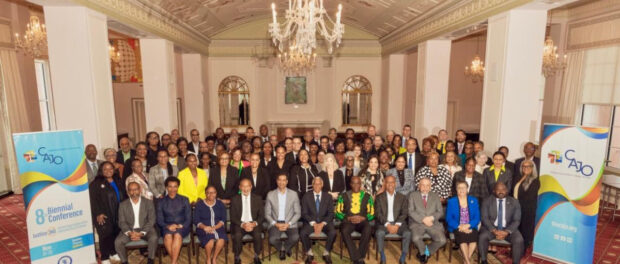REGIONAL JUDICIAL OFFICERS EMBRACE HOLISTIC APPROACHES TO THE ADMINISTRATION OF JUSTICE

Hamilton, Bermuda. The recently concluded Caribbean Association of Judicial Officers (CAJO) 8th Biennial Conference was one of the most memorable in its history. On location in the host country of Bermuda from 21 to 23 November 2024, the Conference was conferred under the theme of “Justice 360: Holistic Approaches to the Administration of Justice”.
This Conference was one with a difference, offering participants a genuinely interactive experience. The programme was designed to strengthen participant engagement by learning through doing, spanning two and a half days. From the opening ceremony on the first day, the spirits were high, and all 100 attendees were delighted. Following the welcome by Judge of the Caribbean Court of Justice (CCJ) and Chairperson of the CAJO, the Hon. Mr Justice Peter Jamadar, special remarks were provided by Bermuda’s Attorney-General and Minister of Justice, The Hon. Senator Kim Wilkerson, JP; CCJ Judge and Chairperson of the CCJ Academy for Law, the Hon. Mr Justice Winston Anderson; and the Chief Justice of Bermuda, The Hon. Mr Justice Larry Mussenden. Artistic presentations introduced conference participants to rousing Bermudian cultural performances that left many persons on their feet in awe.
Several Heads of Caribbean judiciaries were in attendance and actively participated in the Conference’s sessions. These were: CCJ President, the Hon. Mr Justice Adrian Saunders; Chief Justice of The Bahamas, Sir Ian Winder; Chief Justice of Barbados, the Hon. Mr Justice Leslie Haynes; Chief Justice of Bermuda, the Hon. Mr Justice Larry Mussenden; Chancellor of the Judiciary of Guyana (Ag), the Hon. Mme Justice Yonette Cummings-Edwards; Chief Justice of Guyana (Ag), the Hon. Mme Justice Roxane George; Chief Justice of Jamaica, the Hon. Mr Justice Bryan Sykes; and Vice President of the Joint Court of Justice of Aruba, Curaçao, Sint Maarten and Bonaire, Sint Eustatius and Saba, Mrs Maroeska Scholte. Their presence, experience, and insights added much value to the discussions.
The feature presentation on the first day by the CCJ President, the Hon. Mr Justice Adrian Saunders spotlighted “Celebrating Caribbean Jurisprudence: Intersections between Law, Politics, and Society”, reinforcing the need for judiciaries to incorporate outcome thinking (measurable goals) alongside process thinking (the detailed steps). President Saunders encouraged the judicial officers to share his dream of “control over our constitutions to pass exclusively into the hands of Caribbean people, thereby marking the final step in our journey towards fully independent status”, particularly for those “several important disputes where the law is uncertain or in need of review by an apex court, are left unresolved or insufficiently or inadequately addressed.”
Plenary and breakout sessions were conducted on artificial intelligence in Caribbean judiciaries, management of high-profile matters, creating judiciaries in integrity, breaking cycles of violence against women and girls, conflict management within the judiciary, the management of court resources, and many other issues pertinent to courts in the region. By engaging different teaching-learning models, such as small group work, panel discussions, lecturettes, and question-and-answer segments, the programme offered participants a variety of session topics and ways to interact with the subject material. Fully embracing the wellness theme, this year’s programme included a dedicated segment offering participants practical tools to aid their wellbeing. Also, the use of music and performance not only stimulated the senses but also served as creative outlets for consolidating learning. Markedly, this year’s programme was constructed to allow participants sufficient time to rest and recover from the long conference days and encouraged interaction among their regional colleagues. Social events at the end of each day allowed for building relationships and for networking in a spirit of collegiality, camaraderie and fun.
Notable consultants sharing their expertise at the Conference were Mr L. Anthony Watkins, Principal Consultant and CEO of Odessey Consulting Ltd and Dr Elizabeth Macharia, Legal Adviser, Commonwealth Secretariat. They facilitated sessions on judicial conflict management and court resource management respectively.
In keeping with the CAJO’s Conference theme of Justice 360, the “Sounds of Justice” session was an enthusiastic addition to the Conference this year and featured dramatic participant presentations from the judiciaries of The Bahamas, Bermuda, Guyana, Jamaica, and the CCJ.
At the Association’s Third Annual General Meeting, a new CAJO Management Committee was elected to office and Justice Jamadar was re-elected as CAJO Chair as was Chief Justice Roxane George of Guyana as Vice Chair. The CAJO, cognisant of the importance of the wellbeing of its judicial officers and staff, also adopted a Statement on the Wellbeing of Judicial Officers and Judiciary Staff, building on the July 2024 Nauru Declaration on Judicial Well-being. Additionally, the CAJO reaffirmed the duty and responsibility of all judiciaries and adjudicatory bodies to take all reasonable steps to operate in integrity, and to secure the trust and confidence of the people of the Caribbean, and consequently adopted 10 specific Resolutions deemed essential at this time. The full Statement on Wellbeing and the 10 Resolutions can be accessed on CAJO’s website at https://thecajo.org/reports/.
At the closing ceremony, it was announced that the CAJOs next biennial conference in 2026 will be hosted by the Judiciary and Government of the Co-operative Republic of Guyana.
-End-
Leave a comment
You must be logged in to post a comment.